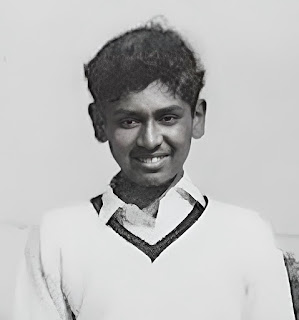CHARNEY HALL Walks on Hampsfell
Updated Feb 2022 with The Bracken Fight
Tony Hampson and Sandy Walls - pupils in the 1950s
Michael Pemberton, Race and David Johnson (a future master) abt 1955
Walks on Hamsfell on a fine summer’s day were a delight. The smell of the fresh Morecambe Bay air blended with perfume from the grasses, bracken and vapour from the peaty ground wafted over us. The sun was hot and in no time we had cast off our jackets and rolled up our sleeves!
The bracken was well established on the fell. It lined many of the paths. In the autumn term it turned a russet brown and died back until its re-emergence in the Spring, forcing its way up into the warm light where the vertical stalks spread their fiddleheads to reveal fronds which put the green sward into shade. The mature bracken was stiff and straight, just right for use as a spear. It had the added bonus that when pulled the root was found to be black, ideal for scoring a hit on the white shirt of any unsuspecting boy. Thus the bracken fight was born! Some trimmed off the fronds, whilst others preferred the steadying effect of the green flight ‘feathers’. Here is a beautiful painting, without doubt created by a Charney old boy whose name remains a mystery.
Thanks are due to Tilak who discovered it, recognised its significance and took the trouble to photograph it.
The Bracken Fight
The sight of a Fritillary butterfly skimming over the contours or an enormous hairy Oak Eggar caterpillar crawling across the grass path were a treat. We found Great Crested Newts in small pools at the foot of the fell near the ‘Tanks’. Unforgettable to this day.
Hampsfell Hospice crowned the top of the fell and it was here that we took a break. The word ‘hospice‘ had connotations of sickness and healthcare but this building could not possibly have been used for that as it was only a small limestone tower! There was an external open staircase with an open wobbly wrought iron handrail which wound its way up onto the uneven flat stone roof. The steps were unevenly spaced, quite slippery, even dangerous due to the many feet that had ascended and descended to take in the view. Mounted atop was something that looked very much like a wooden machine gun but was in fact a pointer which when aimed at the lakeland hills arrayed In a line to the north, identified each peak on a clear day.
Down below it was possible to walk into a cold, damp, dark room which was lined with a stone seat and possibly fitted with a fireplace. Definitely not the place to stay on a wind-swept night as there was no door to keep out unwanted guests...but maybe that was its function....I couldn’t think of anything else.
It was on these walks that some pupils became interested in Entomology (the crucifixion of moths and butterflies). No wonder! The variety of moths and butterflies on the pesticide-free fells and well planted gardens was bountiful and our consciences were salved in knowledge that they would only survive for two or more weeks anyway...Mr Duncan's ultra violet moth trap which he put out on the tennis court on selected moonlit nights in the summer term, attracted countless varieties. These were duly divided up between the keenest of boys the following morning.....A few days later they would appear neatly pinned out, wings outstretched, on setting boards....
I have to admit that I was culpable. Now I am forever burdened with a guilty conscience.







Comments
In the Autumn Term of 1954 there were 3 Johnsons who attended CH. The one in the second photo of this post is David G Johnson. I think his elder brother was J B Johnson. M H Pemberton (53-56)and G M Race (53-56) also feature.